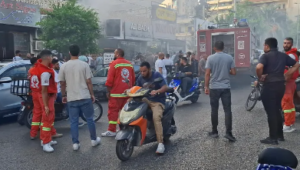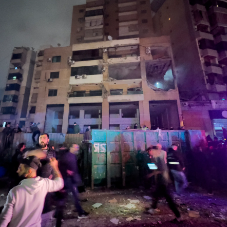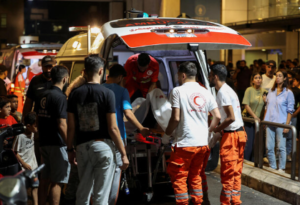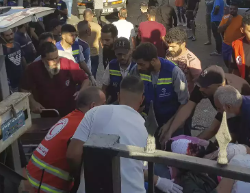In a chilling escalation of tensions, Lebanon’s leadership has issued stark warnings about the risk of further violence following a series of devastating explosions involving communications devices linked to Hezbollah. Over the past two days, these blasts have tragically claimed at least 37 lives and injured more than 3,000 individuals, plunging the nation into uncertainty and fear.
A Dire Situation Unfolds
The recent attacks, described by Economy Minister Amin Salam as a “very serious escalation,” have created an atmosphere of alarm across the country. “The next 48 hours will be particularly dangerous,” Salam cautioned, underscoring the heightened risk of retaliatory actions and conflict. Hezbollah has condemned the explosions as an act of “Israeli aggression,” while Israel has remained silent on the incidents, further fueling the already tense atmosphere.
The blasts targeted thousands of pagers and two-way radios utilized by members of Hezbollah, marking an unprecedented and catastrophic sabotage. Among the injured was Iran’s ambassador to Lebanon, Mojtaba Amani, and the attack claimed the life of a Hezbollah parliament member’s son, raising the stakes for an already volatile situation.
Unifying Forces Amidst Chaos
Minister Salam noted that the attacks have inadvertently galvanized support for Hezbollah, even among those who previously opposed the group. “It created a massive, massive reaction,” he stated, highlighting an extraordinary unification among various Lebanese factions against perceived threats. This collective response underscores the deep-seated fears of a potential escalation into broader conflict.
Health Minister Firas Abiad reported overwhelming pressure on Lebanon’s healthcare system, with nearly 2,800 patients flooding emergency rooms. He emphasized that any further violence could severely strain an already fragile infrastructure, which has been battered by economic crises in recent years.

A Fragile Nation on the Brink
The implications of these attacks extend beyond immediate casualties. Lebanon’s economy, one of the most indebted in the world, faces an uphill battle as it grapples with the aftermath of this crisis. The ministerial warnings signal a pivotal moment for the nation, as public sentiment shifts towards heightened vigilance and solidarity in the face of external threats.
As U.S. officials scramble to facilitate a diplomatic resolution and prevent an all-out war, the Israeli military’s movements towards the northern border add to the growing tension. Israeli Defense Minister Yoav Gallant has indicated a “new phase” in military operations, escalating concerns of widespread conflict in a region already rife with instability.
Seeking Diplomatic Solutions
Despite the mounting challenges, Lebanon’s government remains committed to pursuing diplomatic avenues to resolve the crisis. Minister Abiad reiterated, “Lebanon does not want war… we believe that a diplomatic solution is the best option.” However, the recent escalations complicate these efforts, leaving the nation in a precarious position as it faces an uncertain future.
As Lebanon stands at a crossroads, the world watches closely, hoping for a peaceful resolution to a crisis that threatens to engulf the region in further turmoil.
In a chilling escalation of tensions, Lebanon’s leadership has issued stark warnings about the risk of further violence following a series of devastating explosions involving communications devices linked to Hezbollah. Over the past two days, these blasts have tragically claimed at least 37 lives and injured more than 3,000 individuals, plunging the nation into uncertainty and fear.
A Dire Situation Unfolds
The recent attacks, described by Economy Minister Amin Salam as a “very serious escalation,” have created an atmosphere of alarm across the country. “The next 48 hours will be particularly dangerous,” Salam cautioned, underscoring the heightened risk of retaliatory actions and conflict. Hezbollah has condemned the explosions as an act of “Israeli aggression,” while Israel has remained silent on the incidents, further fueling the already tense atmosphere.
The blasts targeted thousands of pagers and two-way radios utilized by members of Hezbollah, marking an unprecedented and catastrophic sabotage. Among the injured was Iran’s ambassador to Lebanon, Mojtaba Amani, and the attack claimed the life of a Hezbollah parliament member’s son, raising the stakes for an already volatile situation.

Unifying Forces Amidst Chaos
Minister Salam noted that the attacks have inadvertently galvanized support for Hezbollah, even among those who previously opposed the group. “It created a massive, massive reaction,” he stated, highlighting an extraordinary unification among various Lebanese factions against perceived threats. This collective response underscores the deep-seated fears of a potential escalation into broader conflict.
Historically, Hezbollah has been a dominant force in Lebanese politics, often at odds with the Israeli military. The group has engaged in numerous conflicts with Israel since its emergence in the 1980s, most notably during the 2006 war, which devastated parts of Lebanon. The recent attacks evoke memories of these conflicts, intensifying concerns about a new cycle of violence.
A Fragile Nation on the Brink
The implications of these attacks extend beyond immediate casualties. Lebanon’s economy, one of the most indebted in the world, faces an uphill battle as it grapples with the aftermath of this crisis. The country has been mired in economic turmoil, suffering from hyperinflation, power outages, and a crumbling healthcare system. Minister Abiad reported overwhelming pressure on Lebanon’s healthcare system, with nearly 2,800 patients flooding emergency rooms. He emphasized that any further violence could severely strain an already fragile infrastructure.
Humanitarian Impact
The humanitarian ramifications are dire. The influx of casualties has overwhelmed medical facilities, with reports indicating that approximately 300 patients are in critical condition. Abiad noted that over 450 individuals required surgeries for severe injuries, further stressing an already overburdened healthcare system. The attacks have left families mourning lost loved ones, with children among the fatalities, igniting public outrage and calls for justice.
International Reactions and Diplomatic Efforts
As U.S. officials scramble to facilitate a diplomatic resolution and prevent an all-out war, reactions from the international community have varied. Countries across the region are closely monitoring the developments, concerned about the potential for a wider conflict that could destabilize the entire Middle East.
Israeli military movements towards the northern border add to the growing tension. Israeli Defense Minister Yoav Gallant has indicated a “new phase” in military operations, escalating concerns of widespread conflict in a region already rife with instability. Meanwhile, international organizations are urging for calm and dialogue to avert further violence.
Seeking Diplomatic Solutions
Despite the mounting challenges, Lebanon’s government remains committed to pursuing diplomatic avenues to resolve the crisis. Minister Abiad reiterated, “Lebanon does not want war… we believe that a diplomatic solution is the best option.” However, the recent escalations complicate these efforts, leaving the nation in a precarious position as it faces an uncertain future.
As Lebanon stands at a crossroads, the world watches closely, hoping for a peaceful resolution to a crisis that threatens to engulf the region in further turmoil. The coming days will be crucial in determining whether diplomacy can prevail over violence, or if Lebanon will be plunged deeper into conflict.

